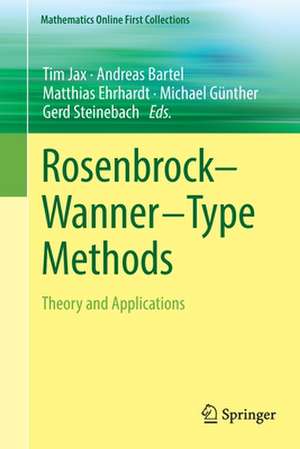Rosenbrock—Wanner–Type Methods: Theory and Applications: Mathematics Online First Collections
Editat de Tim Jax, Andreas Bartel, Matthias Ehrhardt, Michael Günther, Gerd Steinebachen Limba Engleză Paperback – 25 iul 2021
This book discusses the development of the Rosenbrock—Wanner methods from the origins of the idea to current research with the stable and efficient numerical solution and differential-algebraic systems of equations, still in focus. The reader gets a comprehensive insight into the classical methods as well as into the development and properties of novel W-methods, two-step and exponential Rosenbrock methods. In addition, descriptive applications from the fields of water and hydrogen network simulation and visual computing are presented.
Preț: 379.30 lei
Nou
Puncte Express: 569
Preț estimativ în valută:
72.58€ • 75.97$ • 60.41£
72.58€ • 75.97$ • 60.41£
Carte tipărită la comandă
Livrare economică 31 martie-14 aprilie
Preluare comenzi: 021 569.72.76
Specificații
ISBN-13: 9783030768096
ISBN-10: 3030768090
Pagini: 120
Ilustrații: VII, 120 p. 36 illus., 17 illus. in color.
Dimensiuni: 155 x 235 mm
Greutate: 0.21 kg
Ediția:1st ed. 2021
Editura: Springer International Publishing
Colecția Springer
Seria Mathematics Online First Collections
Locul publicării:Cham, Switzerland
ISBN-10: 3030768090
Pagini: 120
Ilustrații: VII, 120 p. 36 illus., 17 illus. in color.
Dimensiuni: 155 x 235 mm
Greutate: 0.21 kg
Ediția:1st ed. 2021
Editura: Springer International Publishing
Colecția Springer
Seria Mathematics Online First Collections
Locul publicării:Cham, Switzerland
Cuprins
- Rosenbrock-Wanner Methods: Construction and Mission. - Water and Hydrogen Flow in Networks: Modelling and Numerical Solution by ROW Methods. - Exponential Rosenbrock Methods and Their Application in Visual Computing. - W-Methods and Approximate Matrix Factorization for Parabolic PDEs with Mixed Derivative Terms. - Two-StepW-Methods.
Notă biografică
Tim Jax is Postdoc at University of Applied Sciences Bonn-Rhein-Sieg and German Aerospace Center, Cologne. He received his doctorate at Institute of Mathematical Modelling, Analysis and Computational Mathematics (IMACM) at the University of Wuppertal. His field of research is the enhancement of Rosenbrock–Wanner–Type Methods towards W-methods for DAEs and applications in network simulation.
Andreas Bartel has his habilitation and is lecturer at the chair of applied mathematics within the Institute of Mathematical Modelling, Analysis and Computational Mathematics (IMACM) at the University of Wuppertal. His research interests include modelling and simulation for computational engineering, in particular coupled systems (PDAEs) and time domain methods.
Matthias Ehrhardt is a professor of applied mathematics and numerical analysis at the IMACM, the Institute of Mathematical Modelling, Analysis and Computational Mathematics at the University of Wuppertal, Germany. His research focus in the numerical treatment of partial differential equations, especially on unbounded domains and numerical methods in computational finance.
Michael Günther is a full professor of applied mathematics at the IMACM, the Institute of Mathematical Modelling, Analysis and Computational Mathematics at the University of Wuppertal, Germany. His main field of research is modelling, analysis and numerical simulation of time-dependent coupled heterogeneous problems with applications in computational engineering, computational finance and computational physics.
Gerd Steinebach is professor of mathematics and research representative in the field of modelling and simulation in the Institute of Technology, Resource and Energy-Efficient Engineering at University of Applied Sciences Bonn-Rhein-Sieg. His areas of specialization are numerical methods for differential-algebraic systems with applications in energy and fluid flow network simulation.
Textul de pe ultima copertă
This book discusses the development of the Rosenbrock—Wanner methods from the origins of the idea to current research with the stable and efficient numerical solution and differential-algebraic systems of equations, still in focus. The reader gets a comprehensive insight into the classical methods as well as into the development and properties of novel W-methods, two-step and exponential Rosenbrock methods. In addition, descriptive applications from the fields of water and hydrogen network simulation and visual computing are presented.
Caracteristici
Gives a detailed overview of the history of Rosenbrock–Wanner methods Goes into detail about further developments towards W-methods, exponential methods and two-step methods Includes practical applications in the fields of network simulation and visual computing


